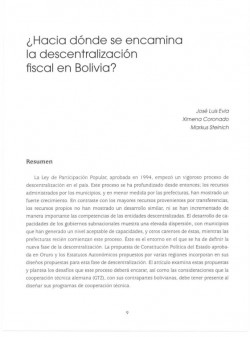Where is fiscal decentralization heading in Bolivia?
DOI:
https://doi.org/10.35319/lajed.200810176Keywords:
Popular Participation Law, Decentralization, AutonomyAbstract
The Popular Participation Law, passed in 1994, began a vigorous process of decentralization in the country. This process has deepened since then; the resources administered by the municipalities, and to a lesser extent by the prefectures, have shown strong growth. In contrast to the greater resources from transfers, own resources have not shown a similar development, nor have the powers of decentralized entities increased significantly. The capacity development of subnational governments shows a high dispersion, with municipalities that have generated an acceptable level of capabilities, and others lacking these, while the prefectures have just begun this process. This is the environment in which the new phase of decentralization has to be defined. The proposed Political Constitution of the State approved in Oruro and the Autonomous Statutes proposed by various regions incorporate in their designs proposals for this decentralization phase. The article examines these proposals and raises the challenges that this process must face, as well as the considerations that the German technical cooperation (GTZ), with its Bolivian counterparts, must bear in mind when designing its technical cooperation programs.
Downloads
References
Aguilar, J. y F. Ruiz 2004. "Lineamientos de la política de transferencias condicionadas (PTC) a gobiernos municipales". Directorio Único de Fondos. Mimeo.
Banco Mundial. 2006. "La segunda fase de la descentralización en Bolivia". Institutional Governement Review.Volumen 2. Washington D.C.
Banco Mundial. 2006. "Hacia una descentralización incluyente" Tomo I: Informe Principal. Washington D.C.
Gesellschatf fur technische Zusammenarbeit (GTZ). 2001. Marzo. “Pautas técnicas para la descentralización". Mimeo.
Programa de las Naciones Unidad para el Desarrollo (PNUD) y Universidad Externado de Colombia 2006. Diciembre. “Lineamientos básicos para la descentralización administrativa y fiscal. Manual de orientación". Editores: Sonia Durán y David Soto. Centro sw Conocimientos y Servicios para el Desarrollo en América Latina.
Shah, Anwat. 2007 Introduction: “Principles of Fiscal Federalism". En: Shah. Anwat (ed.)The Practice of Fiscal Federalism: Comparative Perspectives.(A Global Dialogue on Federalism Vol.4). Forum of Federations e International Association of Centers for Federal Studies.






